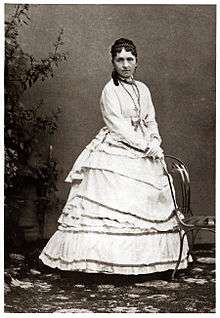Julia, Princess of Battenberg
| Countess Julia Hauke | |||||
|---|---|---|---|---|---|
| Princess of Battenberg | |||||
 Julia Hauke, Princess of Battenberg | |||||
| Born |
24 November 1825 Warsaw, Congress Poland | ||||
| Died |
19 September 1895 (aged 69) Heiligenberg Castle, Jugenheim, Hesse | ||||
| Spouse | Prince Alexander of Hesse and by Rhine | ||||
| Issue |
Marie, Princess of Erbach-Schönberg Louis Mountbatten, 1st Marquess of Milford Haven Alexander, Prince of Bulgaria Prince Henry Prince Francis Joseph | ||||
| |||||
| Father | Count John Maurice Hauke | ||||
| Mother | Sophie Lafontaine | ||||
Julia, Princess of Battenberg (24 November [O.S. 12 November] 1825 – 19 September 1895) was the wife of Prince Alexander of Hesse and by Rhine, the mother of Alexander, Prince of Bulgaria, and ancestress to the current generations of the British and the Spanish royal families.
Life
Julie (or Julia) Therese Salomea Hauke[1] was born in Warsaw (Congress Poland), then ruled in personal union by the Tsar of Imperial Russia. She was the daughter of John Maurice Hauke, a German soldier, and his wife Sophie (née Lafontaine). Julie was rumored to be of Jewish descent.[2]


Julia's father had fought in Napoleon's Polish Legions in Austria, Italy, Germany and the Peninsular War. After his service in the Polish army since 1790 and the army of the Duchy of Warsaw from 1809 to 1814, he entered the ranks of the army of Congress Poland, became a full-fledged general in 1828 and was awarded a Polish title of nobility. Recognizing his abilities, Tsar Nicholas I appointed him Deputy Minister of War of Congress Poland and elevated him and his family in 1829 to the rank of counts, automatically making Julia a countess. In the November Uprising of 1830 led by rebelling army cadets, Grand Duke Constantine, Poland's de facto viceroy, managed to escape, but Julia's father was shot dead by the cadets on a Warsaw street. Her mother died of shock shortly afterwards, and their children were made wards of the Tsar.
Julia served as lady-in-waiting to Tsesarevna Marie Alexandrovna, wife of the future Tsar Alexander II and sister of Prince Alexander of Hesse and by Rhine. She met Prince Alexander while performing her duties at court in St. Petersburg. The Tsar did not approve of any liaison between his son's brother-in-law and a parvenu, and so the two arranged to leave the St. Petersburg court. By the time Julia and Alexander were able to marry, she was six months pregnant with their first child, Marie. They were married on 28 October 1851 in Breslau in Prussian Silesia (present-day Wrocław, Republic of Poland).
Julia was considered to be of insufficient rank to have any of her children qualify for the succession to the throne of Hesse and by Rhine (Hesse-Darmstadt); hence the marriage was considered morganatic. Her husband's brother, Grand Duke Louis III of Hesse-Darmstadt, created her Countess of Battenberg in 1851, with the style of Illustrious Highness (Erlaucht), and in 1858 further elevated her to Princess of Battenberg with the style of Serene Highness (Durchlaucht). The children of Julia and Alexander were also elevated to princes and princesses and addressed as Serene Highness. Thus, Battenberg became the name of a morganatic branch of the Grand Ducal Family of Hesse. Julia converted from Roman Catholicism to Lutheranism on 12 May 1875. She died at Heiligenberg Castle, near Jugenheim, Hesse, aged sixty-nine, on 19 September 1895.
Children

There were five children of the marriage, all princes and princesses of Battenberg:
- Marie (1852–1923), married in 1871 Gustav, Count of Erbach-Schönberg (d. 1908), with issue.
- Ludwig (Louis) (1854–1921), created first Marquess of Milford Haven in 1917, married in 1884 Princess Victoria of Hesse and the Rhine (1863–1950), with issue (including Princess Andrew of Greece and Denmark, Queen Louise of Sweden, and the 1st Earl Mountbatten of Burma). In 1917, he and his children gave up their German titles and took the surname Mountbatten.
- Alexander (1857–1893), created Reigning Prince of Bulgaria in 1879, abdicated in Bulgaria and created Count of Hartenau, married morganatically in 1889 Johanna Loisinger (1865–1951), with issue.
- Heinrich (Henry) (1858–1896), married in 1885 Beatrice, Princess of Great Britain and Ireland (1857–1944), with issue (including Princess Victoria Eugenie of Battenberg later Queen of Spain). His children resided in the UK and became lords and ladies with the surname Mountbatten in 1917 (see "Name change" below). His eldest son was created the first Marquess of Carisbrooke in 1917.
- Franz Joseph (1861–1924), married in 1897 Anna Princess Petrovich-Niegosh of Montenegro (1874–1971), with no issue.
Name change to "Mountbatten"
Julia's eldest son, Ludwig (Louis) of Battenberg, became a British subject, and during World War I, due to anti-German sentiment prevalent at the time, anglicised his name to Mountbatten (a literal translation of the German Battenberg), as did his nephews, the sons of Prince Henry and Princess Beatrice. The members of this branch of the family also renounced all German titles and were granted peerages by their cousin King George V of the United Kingdom: Prince Louis became the 1st Marquess of Milford Haven, while Prince Alexander, Prince Henry's eldest son, became the 1st Marquess of Carisbrooke.
Ancestry
| Ancestors of Julia, Princess of Battenberg | |||||||||||||||||||||||||||||||||||||||||||||||||||||||||||||||||||||||||||||||||||||||||||||||||||||||||||||||||||||||||||||||||||||||||||||||||||||||||||||||||||||||||||||||||||||||||||||||||||||||||||||||||||||||||||||||||||||||||||||||||||||||||||||||||||||||||||||||||||||||||||||||||||||||||||||||||||||||||||||||||||||||||||||||||||||||||||||||||||||||||||||||||||||||||||||||||||||||||||||||||||||||||||||||||||||||||||||||||||||||||||||||||||||
|---|---|---|---|---|---|---|---|---|---|---|---|---|---|---|---|---|---|---|---|---|---|---|---|---|---|---|---|---|---|---|---|---|---|---|---|---|---|---|---|---|---|---|---|---|---|---|---|---|---|---|---|---|---|---|---|---|---|---|---|---|---|---|---|---|---|---|---|---|---|---|---|---|---|---|---|---|---|---|---|---|---|---|---|---|---|---|---|---|---|---|---|---|---|---|---|---|---|---|---|---|---|---|---|---|---|---|---|---|---|---|---|---|---|---|---|---|---|---|---|---|---|---|---|---|---|---|---|---|---|---|---|---|---|---|---|---|---|---|---|---|---|---|---|---|---|---|---|---|---|---|---|---|---|---|---|---|---|---|---|---|---|---|---|---|---|---|---|---|---|---|---|---|---|---|---|---|---|---|---|---|---|---|---|---|---|---|---|---|---|---|---|---|---|---|---|---|---|---|---|---|---|---|---|---|---|---|---|---|---|---|---|---|---|---|---|---|---|---|---|---|---|---|---|---|---|---|---|---|---|---|---|---|---|---|---|---|---|---|---|---|---|---|---|---|---|---|---|---|---|---|---|---|---|---|---|---|---|---|---|---|---|---|---|---|---|---|---|---|---|---|---|---|---|---|---|---|---|---|---|---|---|---|---|---|---|---|---|---|---|---|---|---|---|---|---|---|---|---|---|---|---|---|---|---|---|---|---|---|---|---|---|---|---|---|---|---|---|---|---|---|---|---|---|---|---|---|---|---|---|---|---|---|---|---|---|---|---|---|---|---|---|---|---|---|---|---|---|---|---|---|---|---|---|---|---|---|---|---|---|---|---|---|---|---|---|---|---|---|---|---|---|---|---|---|---|---|---|---|---|---|---|---|---|---|---|---|---|---|---|---|---|---|---|---|---|---|---|---|---|---|---|---|---|---|---|---|---|---|---|---|---|---|---|---|---|---|---|---|---|---|---|---|---|---|---|---|---|---|---|---|---|---|---|---|---|---|---|---|---|---|---|---|---|---|---|---|---|---|---|---|---|---|---|
| |||||||||||||||||||||||||||||||||||||||||||||||||||||||||||||||||||||||||||||||||||||||||||||||||||||||||||||||||||||||||||||||||||||||||||||||||||||||||||||||||||||||||||||||||||||||||||||||||||||||||||||||||||||||||||||||||||||||||||||||||||||||||||||||||||||||||||||||||||||||||||||||||||||||||||||||||||||||||||||||||||||||||||||||||||||||||||||||||||||||||||||||||||||||||||||||||||||||||||||||||||||||||||||||||||||||||||||||||||||||||||||||||||||
See also
Literature
- Almanach de Gotha, Gotha 1931
- Eckhart G. Franz, Das Haus Hessen: Eine europäische Familie, Kohlhammer, Stuttgart 2005 (S. 164–170), ISBN 3-17-018919-0
References
- ↑ Profile, wargs.com; accessed 2 April 2014
- ↑ http://nla.gov.au/nla.news-article150334687
- ↑ Paget, Gerald (1977), The Lineage & Ancestry of HRH Prince Charles, Prince of Wales, Edinburgh and London: Charles Skilton